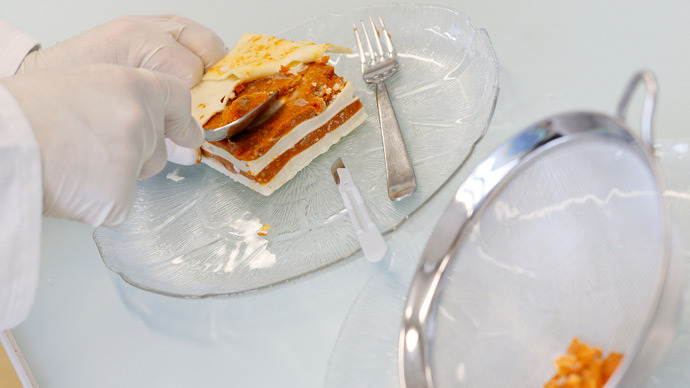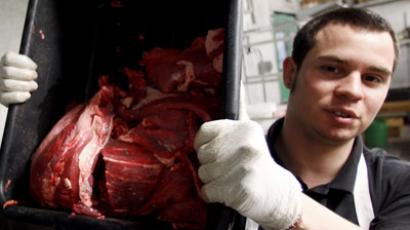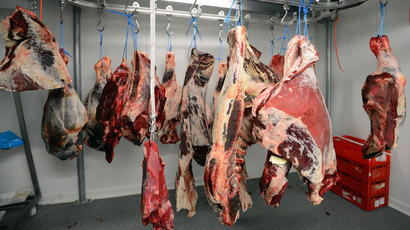Banned drug in EU horsemeat claimed to be ‘not worrying’

A non-steroidal drug long banned in the US and the EU was found in latest testing in the wake of the horsemeat scandal. The equine carcasses contained only 0.5 per cent phenylbutazone, posing no health risks to humans, officials claim.
The drug - routinely used as painkillers in human and veterinary medicine - is no longer approved for human use in the US and the EU for fear it may cause suppression of white blood cell production and aplastic anemia. Phenylbutazone, aka bute, first became available in America in the early 1950s for the treatment of rheumatoid arthritis and gout in humans.
It was banned several decades ago, having proved to be life-threatening for humans.
Some 7,259 tests were carried out by the “competent authorities” in the 27 EU countries, of which 4,144 tested for the presence of horsemeat DNA and 3,115 tested for the presence of phenylbutazone. Of those tests, 193 revealed positive traces of horsemeat DNA and 16 showed positive traces of bute.
While less than one third of horse meat sold in Europe comes from horses imported from North America, France had found the most beef products containing horse DNA and the UK had detected the most traces of the notorious painkiller.
Britain had 14 positive tests for the potentially-harmful veterinary drug; the only other countries to find bute in horsemeat were Ireland and the Czech Republic, each recording a single positive result.
"The bute is now really concentrated in the UK, but mainly because the UK has tested every horse slaughtered since February, so they have done a huge number of tests - more than 800," a senior EU source who spoke on condition of anonymity told Reuters.
The joint statement, published by the European Food Safety Authority (EFSA) and the European Medicines Agency (EMA) earlier this week, has however concluded that the illegal presence of residues of phenylbutazone in horsemeat is of “low concern for consumers due to the low likelihood of exposure and the overall low likelihood of toxic effects.”

At the same time, the EFSA and the EMA have confirmed that it is not possible to set safe levels for phenylbutazone in food products of animal origin and therefore its use in the food chain should remain prohibited.
The European Food Safety Authority clearly states on its website that phenylbutazone is “not allowed in the food chain and findings of this substance in horsemeat are the result of illegal entry into the food chain of carcasses of horses treated with the substance.”
According to EU legislation, treatment of horses with phenylbutazone must be recorded in their “horse passport” for the definitive exclusion of the animals from slaughter for human consumption.
Commissioner for Health and Consumers Tonio Borg believes that the recent tests’ findings only confirmed that "this is a matter of food fraud and not of food safety.”
"In the coming months, the commission will propose to strengthen the controls along the food chain in line with lessons learned," he promised.

However, some doctors say that health risks associated to horsemeat are not limited to bute.
In her statement, Joanna Swabe of Humane Society International has accused the EC of failing to meet consumers’ expectations and not conducting tests for other “banned veterinary drugs, which are commonly administered to horses.”
“Testing for just one of the many drugs banned for use in animals that enter the food chain falls short of a precautionary and thorough approach to addressing fraud and ensuring food safety standards are met,” she said.
The European Commission and Member State experts are due to meet on April 19 to propose a set of new rules on meat-product labels and further investigate fraudulent practices and to try boost consumer confidence following the mislabeling of beef products containing horse meat.
Imposing “dissuasive financial sanctions” on food fraudsters are amongst the proposals.















